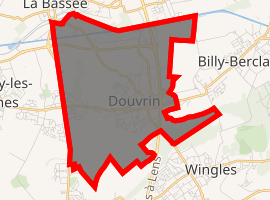Douvrin
Douvrin is a commune in the Pas-de-Calais department in the Hauts-de-France region of France.
Douvrin | |
|---|---|
The town hall of Douvrin | |
 Coat of arms | |
Location of Douvrin 
| |
 Douvrin  Douvrin | |
| Coordinates: 50°30′38″N 2°49′56″E | |
| Country | France |
| Region | Hauts-de-France |
| Department | Pas-de-Calais |
| Arrondissement | Béthune |
| Canton | Douvrin |
| Intercommunality | CA Béthune-Bruay, Artois-Lys Romane |
| Government | |
| • Mayor (2014–2020) | Jean-Michel Dupont |
| Area 1 | 9.58 km2 (3.70 sq mi) |
| Population (2017-01-01)[1] | 5,407 |
| • Density | 560/km2 (1,500/sq mi) |
| Time zone | UTC+01:00 (CET) |
| • Summer (DST) | UTC+02:00 (CEST) |
| INSEE/Postal code | 62276 /62138 |
| Elevation | 19–32 m (62–105 ft) (avg. 25 m or 82 ft) |
| 1 French Land Register data, which excludes lakes, ponds, glaciers > 1 km2 (0.386 sq mi or 247 acres) and river estuaries. | |
Geography
An ex-coalmining town some 10 miles (16.1 km) east of Béthune and 15 miles (24.1 km) southwest of Lille, at the junction of the D165, the D163 and the N47 roads. Since the mid-1960s, farming and light industry have replaced coal mining as the principle occupations.
History
First recorded in the eleventh century, the town has been known by several variations of the name:
Doverin (in 1098), Dovring (in 1120), Dovrin (in 1149), Dovrign (in 1218), Douvringnum (in 1229), Douvrin (in the fifteenth century) and also as Douvrain (in 1652).
The town suffered considerable damage during World War I.
Coal mining was the main livelihood here for around 100 years, from the mid-nineteenth century until the 1960s when the reserves became uneconomic.
Since 1969, Française de Mécanique, part of PSA Peugeot Citroen has produced motor-car engines at the plant immediately north of the commune. Over 3,400 people work here, producing 7000 units a week.
Population
| Year | 1962 | 1968 | 1975 | 1982 | 1990 | 1999 | 2005 |
|---|---|---|---|---|---|---|---|
| Population | 4350 | 4659 | 4736 | 4415 | 5442 | 5431 | 5265 |
| From the year 1962 on: No double counting—residents of multiple communes (e.g. students and military personnel) are counted only once. | |||||||
Places of interest
- The church of Sacre-Coeur, rebuilt, as was most of the town, after World War I.